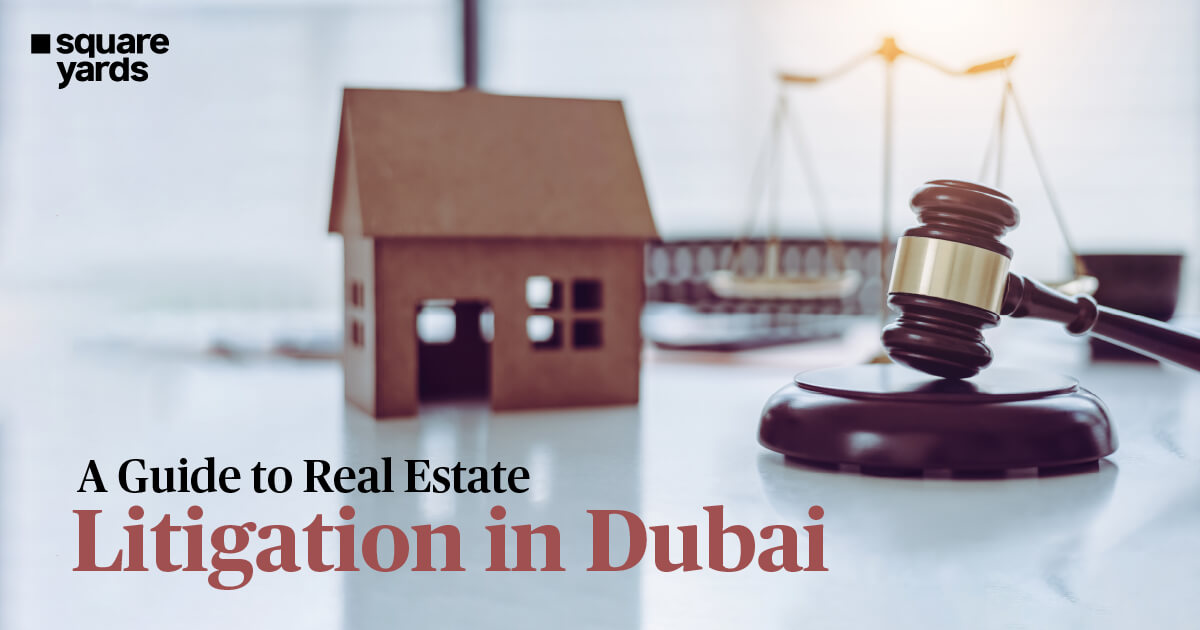Buying a property in Dubai is what every prospective buyer dreams of, but it brings common real estate disputes that must be resolved. No matter whether you’re a condominium association, a residential property owner, a commercial realty developer or a property management company, it is highly likely that you will find yourself caught in real estate litigation at some point in time. Depending on the nature of the disputes, some can be fixed out of court, but real estate litigation in Dubai becomes crucial when the parties involved do not agree to a single solution. So, if you ever find yourself involved in such a situation, this guide will help you. Here, we have in-depth information on the reasons behind real estate litigation in Dubai and legal remedies to solve them.
What is Real Estate Litigation?
Real estate litigation in Dubai is a course of action that one party takes on another over a property dispute. Sometimes, parties involved in a real estate transaction cannot agree, which calls for taking the matter to court. The court then suspects the case and passes its final verdict, which completely depends upon the findings. One thing to note is that real estate litigation does not always happen between tenants and landlords. Yes, that’s true! In reality, all concerned parties, like property managers, real estate agents, brokers etc., can become a part of real estate disputes in Dubai. People here can seamlessly open a case for any issue, such as filing a rental dispute in Dubai or any other Emirate. However, remember that this procedure might be time-consuming and comes with a fee. Therefore, involved parties generally try to solve the dispute outside of court and consider litigation as a last resort for unsolved matters.
Most Common Causes of Real Estate Litigation

The 7 common causes of real estate litigation in Dubai are as follows:
-
Reason 1: Breach of Contract
Like every other business, realty dealing and agreement terms are documented in contracts. These contracts lay down the conditions agreed upon by all parties involved. However, litigation might be the last option if any involved parties breach the contract.
For example, if a property seller refuses to hand over the house appliances, which was a term in the contract, then it will be treated as a breach of contract, and the buyer has the right to take the matter to court.
-
Reason 2: Eminent Domain
There are times when the government can seize private property for public use. This government seizure of private property can lead to disputes over fair compensation.
For example, you live in a cosy house near a park you love. The government decides they want to build a new library, and the best spot for it is where your house stands. They tell you they need your property to make room for the library. So, in this case, the government will seize your property for public use, which can lead to disputes.
-
Reason 3: Title Disputes

In India, disputes over property titles frequently end in court cases. A title serves as documentation of a person’s ownership rights. Issues may arise if the title is ambiguous or inaccurate. The reason is frequently due to errors or fraud in the title paperwork. It may involve incorrect property information, forged paperwork, or unpaid bills. Buyers are always advised to thoroughly inspect the property title to reduce the possibility of title problems later. Also, before purchasing a home, always confirm the paperwork is authentic.
For example, a family buys a house, but another person says they also own part of it because of something that happened in the past. They go to court to figure out who is the real owner of the house.
-
Reason 4: Environmental Concerns
Environmental issues such as pollution, contamination or non-compliance with environmental rules and regulations can lead to real estate disputes in Dubai.
For example, imagine you’re a resident in a Dubai apartment complex and notice a strong chemical smell coming from the ground near the complex. This environmental concern can give rise to real estate disputes.
-
Reason 5: Construction Defects
The property seller is always responsible for disclosing known construction defects that are not evident and could affect the property’s value. Later, if the home buyer discovers any undisclosed defects after closing the deal, he/she can pursue legal action against the seller. Common property defects involve mould in the walls, roof leaks, holes in the roof, etc.
For example, a buyer buys a warehouse with some electrical issues; the seller knows the same but doesn’t disclose it. The buyer later faces a $5000 repair bill. In this case, the buyer can sue the seller for failing to disclose a property defect known to him when closing the deal.
-
Reason 6: Misrepresentation and Fraud
If property details are intentionally misrepresented, it can lead to litigation. Moreover, fraudulent actions can also lead to legal battles.
For example, imagine you’re looking to buy a house in Dubai. The seller tells you the house is in perfect condition and has no issues. He even provides a glossy brochure showcasing recent renovations and repairs. But, shortly after moving in, you start noticing leaks in the roof, faulty plumbing, and electrical problems that were not disclosed.
-
Reason 7: Negligence
Real estate agents have a legal responsibility to act in the best interest of their clients and not in the interest of a third party so that they can be sued for breach of duty or negligence. Realty agents must keep client-related information completely confidential. Otherwise, they will be held responsible for any suffering caused by their negligence. Also, brokers must disclose all information that can be useful to their customers.
For example, a broker already knows that the property has a defect and refuses to disclose the same to the client because he wants the commission out of that sale. In such a case, the client has the legal right to file a lawsuit against the agent as he neglected to perform in the client’s best interest.
These are just some of the most common reasons behind real estate litigation. Speaking to a real estate litigation in Dubai attorney is necessary if you are involved in any such issue.
The Litigation Process

If parties involved in the property transaction have failed to agree, it’s time to take the dispute to court. A real estate attorney must be hired to take the dispute to court and look after the proceedings.
Now, let’s have a look at the process of litigation.
Step 1: The party gets in touch with a professional real estate dispute lawyer
Step 2: The legal team examines the case and the evidence presented
Step 3: The lawyer reviews the title deed and all other paperwork
Step 4: Case analysis
Step 5: The firm delivers a demand package to the other party
Step 6: Waits for the other party to respond
Step 7: The legal team starts a lawsuit
Step 8: The last round of negotiations to reach an agreement outside of court
Step 9: The test
This is how a real estate litigation process works.
NOTE: It’s essential to understand that the process might change based on the case and the law firm.
Top 5 Mistakes Real Estate Investors Must Avoid
If you are new to real estate, then make sure you avoid making several classic mistakes mentioned below:
1. Not Doing the Research
Homebuyers’ foremost mistake in the real estate transition is skimping on research. Researching the property market is the basic step that must be done primarily. You must always be ready to ask many questions about the property you are interested in and the locality in which the property is located. Moreover, you must ask if the area will significantly change household types or demographics. But yes, these questions do not end here. Ensure you create a list of all such questions and do in-depth research before finalising the deal.
2. Not Getting Everything in Writing
As a homebuyer or property investor, you must never rely on the verbal commitments given by your seller or real estate agent because there might be a time when your seller or broker won’t agree to the terms they said earlier. Therefore, to be in safe hands, always get everything in writing so that you can use the same proof later when they refuse to agree on something they agreed on before.
3. Not Hiring an Experienced Real Estate Attorney
Many home buyers and investors think they can solve any real estate dispute themselves without knowing they can land themselves in a troublesome situation. Therefore, hiring an experienced real estate lawyer to help you with dispute settlement at each step of your real estate transaction is always recommended.
4. Not Being Aware of the Laws and Regulations
Not being aware of the rules and regulations that apply to the real estate industry is another common mistake people commit. Before making a fair deal, you must always do research about the market and the laws that apply to it. It will help you prevent fraud and save money by not paying unnecessary fees.
5. Not Being Prepared for the Unexpected
Last but not least, you should always be prepared for unforeseen situations. Instead, you should always be ready to face all the hardships and unexpected things that come your way. Also, you must never lose hope if anything unexpected happens and continue trying your best to get a better deal. And, of course, the real estate market in Dubai never falls short of lucrative property deals.
You will surely play well in Dubai’s real estate market by avoiding the abovementioned mistakes.
Tips to Avoid Real Estate Litigation
Follow the below-mentioned tips to avoid real estate litigation in Dubai.
Tip 1: Thorough Due Diligence
It’s recommended to conduct thorough research and due diligence before finalising the real estate deal. It involves evaluating zoning regulations, property records, title history etc.
Tip 2: Clear Contracts
Make sure you draft and review property-related contracts carefully. Check whether all the parties involved explicitly state and agree upon all the terms and conditions. Also, remember to take legal assistance when reviewing or creating contracts.
Tip 3: Hire a Professional Attorney
Always hire experienced and professional lawyers to guide you through the process. Moreover, their expertise will help you navigate potential risks and frauds.
Tip 4: Home Inspections
Conducting thorough home inspections to identify all the functional and structural issues with the property is always advisable. Addressing these defects before finalising the deal will prevent disputes later.
Tip 5: Open Communication
Always maintain clear and open communication with all the parties involved in the real estate transaction because misunderstandings can sometimes lead to disputes.
Tip 6: Review Property History
Research the property’s history for legal issues, disputes, or conflicts. This information can help you make a well-informed decision.
Tip 7: Know Your Rights and Obligations
Educate yourself about your rights and obligations as a property owner or tenant to avoid unintentional violations that could lead to litigation. Remember, while these tips can help minimise the risk of real estate litigation, seeking legal consultation is always wise to ensure all relevant laws and regulations fully protect you.
Conclusion
Understanding the causes of real estate litigation in Dubai is vital for property buyers and investors. Disputes can arise from a breach of contract, title conflicts etc., but with thorough research, written agreements, hiring an experienced real estate lawyer, and being aware of laws and regulations, you can easily solve any kind of real estate dispute that comes your way.
Recommended for you :
|
Update of Cheque Bounce in UAE |
|
|
All About Dubai Rental Market |
|
|
Guide To Tenancy Contract Sharjah |
|
|
Know About Labour Law in UAE |
Frequently Asked Questions (FAQs)
Legal remedies for real estate disputes in Dubai involve negotiation, mediation, or court proceedings. Negotiation aims to settle disagreements outside of court, while mediation involves a neutral third party helping both sides reach an agreement. If these fail, litigation may proceed, leading to outcomes such as financial compensation, property ownership clarification etc.
Some of the most common outcomes of real estate litigation include monetary settlements, property title clarification, contract rescission, specific performance orders, injunctions, or property partition.
Factors influencing real estate litigation outcomes involve the strength of evidence, contract terms clarity, legal representation quality, judge's interpretation, witnesses' credibility, property documentation, etc. These elements collectively shape how a real estate dispute is ultimately resolved. What are the legal remedies for real estate disputes?
What are some of the most common outcomes of real estate litigation?
What are some of the factors that can affect the outcome of real estate litigation?




